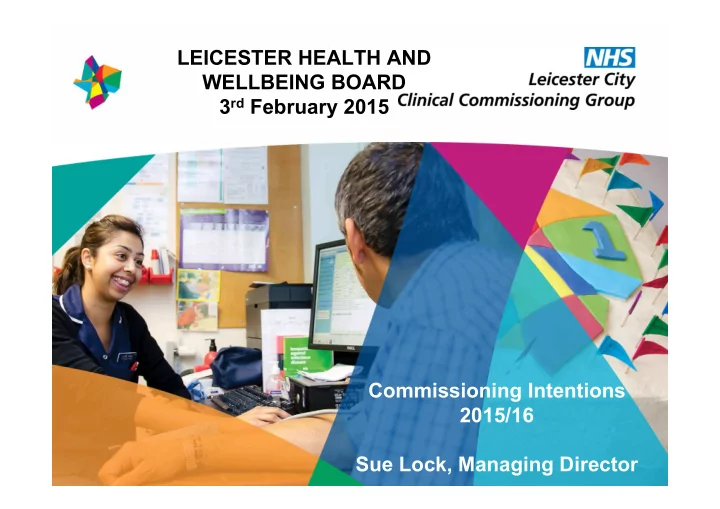

LEICESTER HEALTH AND WELLBEING BOARD 3 rd February 2015 Commissioning Intentions 2015/16 Sue Lock, Managing Director
What are commissioning intentions Each year commissioners in the NHS are required to set out their priorities for the coming year, illustrating how they will use their resources to secure services to improve the health of the communities they serve.
What do commissioning intentions respond to?
Equality Impact Assessments (EIA) • EIAs play an important role in informing our local commissioning intentions. • EIAs are used to inform us of gaps or weaknesses in current services that need to be addressed. • We undertake a single high-level EIA to cover overall commissioning intentions • Individual service-level EIAs are undertaken at implementation stage. • The CCG will not be undertaking individual EIAs until the financial plan has been signed off. 4
Commissioning Intentions for 2015/16 National Planning Guidance The commissioning intentions remain as for 2014/15, except with the following:- •Meet new access targets for mental health services – IAPT and psychosis •Develop and roll out personal health budgets and personalised integrated commissioning •Greater focus on prevention services •Improve CAMHS services •Review services to support carers
Commissioning Intentions for 2015/16 Better Care Together •Improving the urgent care pathway to reduce unnecessary admissions and attendances •Implement the new crisis mental health pathway •Increase independence of frail older people •Improve long term condition management •Review learning disability services to support greater independence •Redesign planned care pathways to ensure effective and efficient care in the right setting
Commissioning Intentions for 2015/16 CCG Priorities •Improved cancer screening rates •Embed local programmes supporting long term condition management − Chronic Obstructive Pulmonary Disease (COPD) − Cardiovascular Disease (CVD) − Diabetes − Chronic Kidney Disease (CKD) − Dementia •Improve care for those in care homes & the housebound •Increase take up of health promotion services
Commissioning Intentions for 2015/16 • Increase take up of local programmes to support key public health issues – smoking cessation and alcohol • Improve the CHC (Continuing Health Care) process to ensure suitable care packages that better support independence • Test CAMHS service referral rates across the city • Establish support for patients and carers going through the personal health budgets process • Improve accessibility of mental health services • Increase take up of dementia services 8
Key issues highlighted in the Equality Impact Assessment Age •Clear focus on improving services for older people •Focus on services for children and young people •No negative impact of commissioning intentions identified Disability •A number of intentions relate to disabilities with the aim of improving outcomes and pathways
Key issues highlighted in the Equality Impact Assessment Gender •Recognition that there are variances in some service outcomes according to gender. Care will be taken to ensure services cater for males and females appropriately and in line with legal requirements. •Examples include access to health promotion services which young males tend not to access as readily as females 10
Key issues highlighted in the Equality Impact Assessment Gender reassignment •Not specifically referenced in intentions, but CCG isworking with providers to ensure services are sensitive to needs •Particular issue with perceived delays in referrals to Gender Reassignment Clinics. •CCG working with LPT to develop self-referral pathways for patients Pregnancy and Maternity •Targeted support for hard to reach groups, aiming to reduce late presentations 11
Key issues highlighted in the Equality Impact Assessment Race •Significant CCG analysis provides ample data to demonstrate variances in outcomes according to race. This is reflected in discrete communities across the city. •Development of health need neighbourhoods aims to address this by bringing local need profiles to service design. •One intention states that the prevention strategy will be planned upon a risk stratification of the local population, using detailed health need data 12
Key issues highlighted in the Equality Impact Assessment Religion •Specific work on the experience of patients and carers of different faiths will inform the end of life service delivery Marriage and Civil Partnerships •No specific commissioning intentions Sexual Orientation •Ongoing monitoring to ensure services are accessible and sensitive to LGBT populatoin 13
Recommend
More recommend